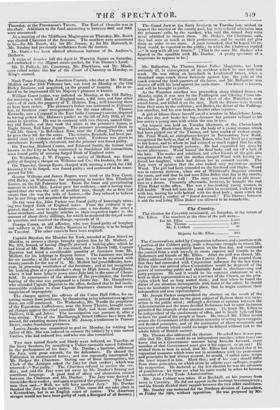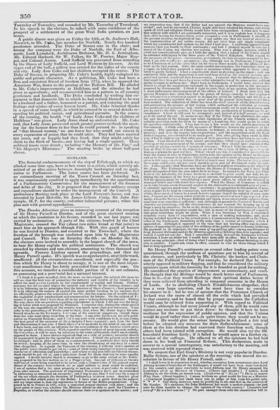Eke Cowan).
The election for Coventry terminated, on Saturday, in the return of Mr. Ellice. The numbers at the close of the pull were—
For Mr. Ellice 1,509 Mr. Thomas 1,206
Mr. J. Cobbett
69 Majority for Mr. Ellice 30:3
The Conservatives, aided by Corporation influence, and a junction with a portion of the Cobbett party, made a desperate struggle to return Mr. Thomas ; but were completely beaten on the first day, and continued the contest from a wish merely to create expense and trouble to the Reformers and friends of Mr. Ellice. After the poll was closed, Mr. Ellice addressed the crowd from the Craven Arms. He assured them that they had contended with Corporation influence for the last time ; for the time was arrived when Corporations would be deprived of the power of converting public and charitable funds to electioneering and party purposes. He said it would be his constant endeavour to act, both as their representative ani as a servant of the Crown, on the prir. ciples which had so long united them ; and that when he found the duties of one situation incompatible with those of the other, he should have no hesitation in resigning his place, that he might continue their independent and true representative.
Mr. Joseph Parkes'congratulated the electors on the result of the contest. It proved that on the great subject of Reform there was no re- action in the public mind ; although a division of opinion between the Administration and the more decided Reformers had in some instances permitted the triumph of the common enemy. He knew Mr. Ellice to be independent of the emoluments of office, and he firmly believed him to have the good of the people at heart. He trusted Mr. Ellice would assure the Government of the absolute necessity of acting upon energetic and decided principles, and of the concession of those reasonable and necessary reforms which could no longer be delayed without risk to the whole fabric of British society.
Mr. Thomas also addressed the electors. He asked bow it was pos- sible that Mr. Ellice could be an independent member, when every one knew that on a Government measure being brought forward, every member of that Government must give it his support, or go out? He wished them to bear in mind, that Mr. Ellice had declared that if he supported measures which were not in accordance with the professions and principles he had always avowed, he would, if called upon, resigns the trust • reposed in him. Mark that ; and if his votes should differ from those principles, on which alone he solicits your suffrages, require his resignation. He declared at the last election lie. was the advocate of prohibition : let them see what his votes would be when he became a member of a Free Trade Administration.
Mr. John Cobbett was taken ill at Brielthill, on his journey from town to Coventry. He did not appear on the hustings in consequence ; and his friends divided their support between the two other candidates. . Mr. Stanley was reelected for the Northern division of Lancashire, on Friday the 12th, without opposition. He was proposed by Mr.
Towneley of Towneley, and seconded by Mr. Towneley of Townhead. In his speech to the electors, he talked with some confidence of the prospect of a settlement of the great West India question, on just terms.
A public dinner was given on Friday the 12th, at St. Andrew's Hall, Norwich, to Mr. Coke, late member for Norfolk. Nearly five hundred gentlemen attended. The Duke of Sussex was in the chair ; and among the company were the Duke of Norfolk, the Earl of Albe- marle, Lord Lynedock, Archdeacon Bathurst, Mr. H. S. Jerningham, Mr. Edward Harbord, Sir W. Folkes, Sir W. Procter, Major Kep- pel, and Colonel Anson. Lord Suffield was prevented from attending by the illness of Lady Suffield, and Lord Western by his own. At the upper end of the hall, a gallery was erected for the ladies of the county and city. Lady Ann Coke and her children occupied the centre. The Duke of Sussex, in proposing Mr. Coke's health, highly eulogized his public and private character. As a politician, Mr. Coke had been a firm and consistent friend of freedom from 1773, when he opposed the American War, down to the passing of the Reform Bill. He alluded to Mr. Coke's improvements at Holkham, and the stimulus he had given to agriculture ; and recommended him as a pattern to all country gentlemen and landlords. The Duke concluded by wishing him en- joyment in that domestic life to which be had retired, blessed as he was as a husband and a father, honoured as a patriot, and enjoying the good feelings and wishes of every honest heart. Mr. Coke returned thanks in a speech of some length, in which he entered in to several details re- specting his political career, and agricultural pursuits. In the course of the evening, the health "of Lady Anne Coke and the children of Holkharn " was given. Lady Anne stood up and curtsied. Mr. Coke said, that Lady Anne possessed much greater powers to thank the meet- ing for the honour done to her than he could pretend to : in speaking of "that blessed woman," no one knew her who would not concur in every expression of praise that he could utter. They had been married . ten years, and so happily had they lived, that they might safely lay claim to the flitch of bacon—not having had a single quarrel. Many political toasts were drunk ; including "the Memory of Mr. Fox," and "his Majesty's Ministers." The meeting broke up about half-past eleven.



















 Previous page
Previous page